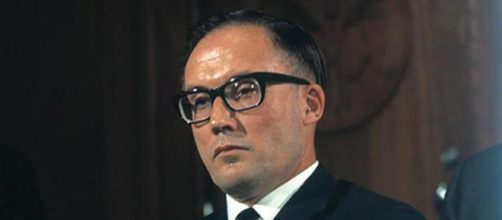Another political arena enters the spotlight next week as a judge from the 10th U.S. Circuit Court of Appeals approaches the Senate for a series of in-depth confirmation hearings. Neil M. Gorsuch is current U.S. President Donald Trump's newest nominee selected to replace Antonin Scalia for Chief Justice of the Supreme Court. On Monday, Judge Gorsuch will face the Senate Judiciary Committee in political standoff of aggressively questioning the judge as the nominee for justice of the high court.
Liberals are preparing to deliver a rigorous fight directed towards Gorsuch.
A fight that they proclaim will rival previous clashes over Supreme Court nominations. Here is a review of four distinct battles for confirmation and the outcomes they received once the challenges brought to the table were finally over:
'An unpopular and unhumanitarian position' faced William H. Rehnquist
Nominated by former U.S. President Ronald Raegan, Rehnquist ranks in the Justice Department as one of the longest serving Supreme Court Justices of all time. He has served the Supreme Court twice, first as an Associate Justice (1971) then as Chief Justice (1986). Judge Rehnquist's confirmation came by a vote set at 68 to 26, making him Chief Justice by 1986 with a vote of 65 to 33.
This Chief Justice is widely known throughout Plessy v.
Ferguson, a case in direct connection to Brown v. Board of Education. In a memo written by Mr. Rehnquist in 1950, he profoundly left a mark on history when he stated, "I realize that this is an unpopular and unhumanitarian position for which I have been excoriated by 'liberal' colleagues, but I think Plessy v. Ferguson was right and should be reaffirmed."
'A high-tech lynching' of the inevitable Clarence Thomas
The scandals that revolved around Judge Clarence Thomas was only one of many involving former U.S. President George H.W. Bush. Nominated back in 1991, Judge Thomas was held with high honors next to Thurgood Marshall until journalist Anita Hill accused him of sexually harassing her.
In a denying response, Clarence Thomas is famed for declaring the Anita Hill scandal a "national disgrace".
His said, "And from my standpoint, as a black American, it is a high-tech lynching for uppity blacks who in any way deign to think for themselves."
Both his battle with Hill and his confirmation hearings equally rattled the United States. He was voted into his seat by the Senate at a vote of 52 to 48.
Louis D. Brandeis was indeed 'a man of infinite cunning'
Depicted as often opposed by the majority within the Judicial Branch, Brandeis was nominated as the first Jewish Supreme Court Justice back in the year of 1916. He endured an anti-Semitic society and barely presented himself to his own confirmation hearings. Despite being a prominent attorney, he as poorly favored by both the American Bar Association and Harvard University.
Former Chief Justice Brandeis took his seat four months after his nomination in a confirmed vote 47 to 22. He became one of the most legendary justices of all time, ironically defining former President Taft's depiction of him as "a man of infinite cunning".
'An intellectual feast' when it comes to being 'Borked'
A former U.S. general, Robert H. Bork, was nominated in 1987 by former U.S. President Ronald Raegan to reign as Supreme Court Justice of the United States of America. Both a scholar and a law professor, Bork had Democrats as well as liberals heavily investigating is constitutional views. He became a Supreme Court icon when he stated prior to his 58 to 42 defeat, "It would be an intellectual feast just to be there and to read the briefs and discuss things with counsel and discuss things with my colleagues." This was his reason as to why he even wanted to serve on the Supreme Court.
The Bork defeat was the largest margin the Senate ever denied a nomination. To this present day, if a nominee is rejected due to conditions not related to their professional background, then he or she has been "Borked".

